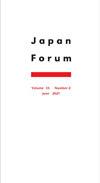Towards a culture of responsibility – relating Fukushima, Chernobyl, and the atomic bombings in Setoyama Misaki’s theatre
IF 0.2
Q2 AREA STUDIES
引用次数: 0
Abstract
Abstract Through a close reading of two post-Fukushima plays by Setoyama Misaki, this article examines the potential of theatre to shape cultural memory and raise critical awareness. The playwright-director is known for exploring contentious issues in Japanese society based on in-depth interviews conducted with the people concerned. Among the various art works addressing the Fukushima nuclear disaster, her plays are rare in exposing how intricately the roles of victim and perpetrator are entangled. Setoyama’s plays raise the question of responsibility so crucial to processing cultural trauma and to triggering traumatogenic change. Relating the Fukushima nuclear disaster to the atomic bombings and the Chernobyl disaster, Setoyama opposes national discourses of a spatially and temporally limited disaster to construct 3.11 as a disaster on a global scale. Almost ten years after the calamity, a broad public debate to attribute responsibility for the nuclear disaster has not yet begun. And with the shift of national attention to the Tokyo Olympics and the global coronavirus pandemic, a rare window of opportunity for transformation in Japanese society is closed. Setoyama’s plays go far beyond the criticism of nuclear power and touch upon essential problems in Japanese society, such as the lack of an open culture of discussion and the strong suppression of dissenting voices, as my analysis will show.走向一种负责任的文化——将福岛、切尔诺贝利和三崎濑山剧院的原子弹爆炸联系起来
摘要通过细读濑户美佐木的两部后福岛戏剧,本文探讨了戏剧在塑造文化记忆和提高批判性意识方面的潜力。这位剧作家兼导演以通过对相关人士的深入采访来探讨日本社会中有争议的问题而闻名。在处理福岛核灾难的各种艺术作品中,她的戏剧很少揭露受害者和肇事者的角色是如何错综复杂地纠缠在一起的。濑户山的戏剧提出了责任问题,这对处理文化创伤和引发创伤源性变化至关重要。Setoyama将福岛核灾难与原子弹爆炸和切尔诺贝利灾难联系在一起,反对将3.11构建为全球范围的灾难的空间和时间有限的国家话语。灾难发生近十年后,一场关于对核灾难负责的广泛公众辩论尚未开始。随着国家对东京奥运会和全球冠状病毒疫情的关注,日本社会一个难得的转型机会之窗关闭了。濑户山的剧本远远超出了对核能的批评,触及了日本社会的基本问题,如缺乏开放的讨论文化和强烈压制反对声音,正如我的分析所表明的那样。
本文章由计算机程序翻译,如有差异,请以英文原文为准。
求助全文
约1分钟内获得全文
求助全文

 求助内容:
求助内容: 应助结果提醒方式:
应助结果提醒方式:


